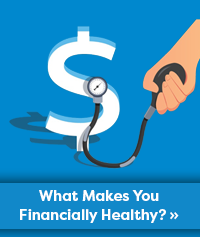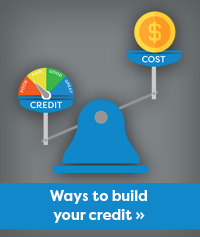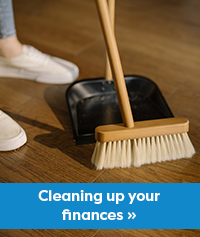Five Ways to Work on Your Financial Fitness

Just as there are countless exercises to choose from, there are many options to consider when it comes to getting financially fit. Here are our top five financial habits you can start today:
Create a budget
If you don’t already have one, consider creating a budget with clear goal(s) each month. Regardless of your income, making it a habit to manage your money will directly contribute to your financial success. For example, creating a budget helps ensure that you have the money you need for your monthly bills. If you forget about a bill and don’t have the right amount in your account, an automatic withdrawal could send you into overdraft or be rejected and both options incur additional costs to you. Ready to get started with a budget? Check out CUA's budget worksheet.
Prepare for the Life’s Surprises
Many people, despite working very hard for their money, don’t pay themselves first. What does this mean? It means putting some money aside for the future before you pay others, so you can address emergency situations if they arise, with little impact to your financial health. Many people find the easiest way to set money aside is to move it into a savings account the same day they are paid, the “set it and forget it” method, with the help of an Automatic Funds Transfer (AFT). There is no minimum amount to get started, and CUA wants to help. Until September 30, 2019, we will contribute $25 to your first deposit if you set up an AFT with a minimum of $50 a month being deposited into a savings account.
Regular Check-Ins
One of the key factors that determines your ability to take on debt, like a mortgage or a loan, is your credit history and information found in your credit report. Many things can impact your credit report, which is why we recommend people take advantage of their free report through Equifax or TransUnion once a year. When it is received, ensure the information is accurate and contact the credit bureau if anything appears to be incorrect. If you’re not sure how to review your credit report, bring it to your next meeting with a member of our team. Your credit score could cost you in the long run if left unattended, so no matter what your credit score is today, let’s work together to make sure you’re on track.
Planning Ahead
Planning ahead can help you make the most of purchases, especially those placed on a credit card. If you’re using a CUA credit card that offers rewards, everyday purchases can provide benefits, if the balance is paid in full each month. Before I make a large purchase on my credit card, I make sure I have the money in my bank account so that I can pay it off before the bill is due. A Line of Credit can also be a great credit tool. If you find yourself in a position where you can’t pay your credit card bill, paying the balance with your Line of Credit can help save on interest charges.
Being Protected
One of the most valuable tools we can use to work on our own fitness is gym equipment, designed specifically to help you exercise safely. When it comes to financial fitness, consider insurance as an important piece of personal equipment that can keep you and your money safe. Doing an annual review of your insurance (including employer insurance coverage) or considering payment protection for new loans or purchases is always recommended.
While these are a few of my own financial habits, there are many others ranging from keeping a piggy bank for loose change to paying off your highest interest debt first. I also recommend starting saving as early as possible, as there’s never a bad time to start saving for your future. What are your financial habits? I’d love to chat with you about how you can choose to change your habits and achieve your financial fitness goals.
Revised Jul. 16, 2021






